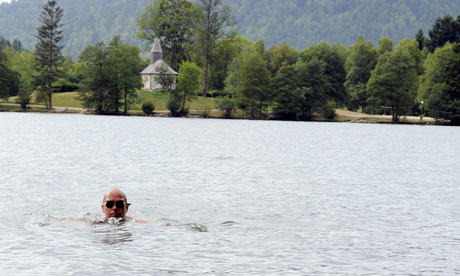
'The frog's-eye view of rain on the moat was magnificent," wrote Roger Deakin of his wild swim in a moat in Suffolk. "Rain calms water, it freshens it, sinks all the floating pollen, dead bumblebees and other flotsam. Each raindrop exploded in a momentary, bouncing fountain that turned into a bubble and burst."
Deakin's magical swim in the rain – and luminescent writing – back in 1996 sparked a renaissance in swimming in places untouched by chlorine or concrete. Wild swimming, as it was rebranded, spawned popular books by Kate Rew and Daniel Start and the endorsement of everyone from Coast presenter Alice Roberts to actor Robson Green.
Now the simple wonder of swimming in wild places has exploded like that raindrop on the water by the revelation that it is a coalition-endorsed activity.
"I love swimming in lakes and the sea, but then doesn't everyone?" Nick Clegg said in the Daily Mail. "In fact, I've taught William Hague to go for swims in the lake at Chevening."
The image of Clegg and Hague comparing goose pimples post-swim at the grounds of the grace-and-favour mansion that they share in Kent is delicious. But is it as toxic for wild swimming as the algae that has stopped people plunging into the Serpentine in London this summer?
"Absolutely not," says Chris Ayriss, author of Hung Out to Dry, a history of wild swimming – a far greater threat is local councils' unfounded fears of being sued over accidents in rivers and lakes.
Health and safety objections are just the latest in a long list of reasons for disapproving of wild swimming. It was popularised by the Romans and the decline of their empire was linked to the "depravity" supposedly stoked by Roman baths. For centuries the Church disapproved of al fresco natural dips. Even when the Victorians recognised the bracing benefits of exercise in cold water, fears persisted that wild swimming corrupted the morals of working-class boys.
Ayriss says councils are simply mistaken to ban wild swimming. "If a council puts in zebra crossing they don't have to erect a sign saying: 'Caution, cross at your own risk,'" he says. "The same is true of swimming. It cannot be that every river and lake in the country is a danger." Despite its trendiness, Ayriss believes that, unlike in France and Spain, fewer British children go wild swimming than ever.
If anyone can turn this around, however, it is the coalition. David Cameron has a "labrador-like tendency to jump into water, no matter how cold," note his biographers Frances Elliott and James Hanning. Cameron's holidays on the Scottish island of Jura have always included a pre-dinner swim in the sea, whatever the weather.
Over to you, prime minister.

